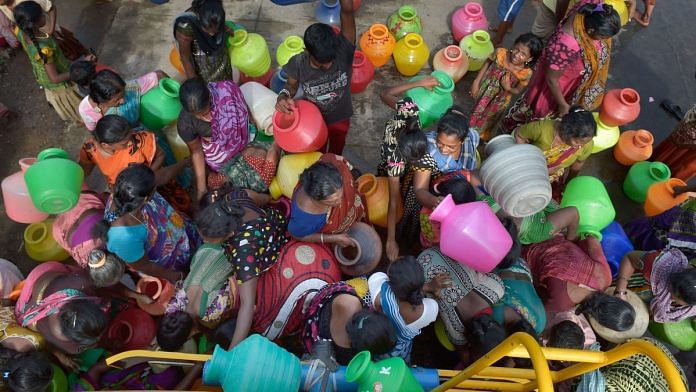New Delhi: Chennai isn’t the only Indian city hurtling headfirst towards a water crisis. Parts of Gurugram in Haryana, Marathwada in Maharashtra and several other regions across India have also been reeling under a severe scarcity of water, even as temperatures are soaring everywhere. But before climate change is blamed for it, the Central Water Commission’s (CWC) June 2019 report makes a stark finding – India is not a water-deficit nation, this crisis is human-made.
The report, published on 26 June by Minister for Jal Shakti Gajendra Singh Shekhawat, states: “India is not a water deficit country but several regions have been experiencing water stress due to severe neglect and lack of monitoring of water resources development projects.”
Titled ‘Reassessment of Water Availability in India Using Space Inputs’, the study was conducted with technical support of the National Remote Sensing Centre (NRSC) in Hyderabad.
The CWC’s report comes at a time when Prime Minister Narendra Modi had reiterated his promise to supply piped water to every household by 2024. The Centre has also rolled out a water conservation plan under the Jal Shakti Abhiyan which will focus on 1,592 “water-stressed” blocks in 257 districts.
Meanwhile, pre-monsoon showers have been at their second-lowest in 65 years this year, and 21 major cities are likely to run out of groundwater by 2020, according to a 2018 report by the NITI Aayog.
India’s population (second largest in the world) is also likely to outgrow its water supply.
Also read: Kejriwal on Delhi water crisis — Everything can’t be done in the first year itself
‘Rewards and Punishments’ for water conservation
The 120-page CWC report suggests not only regulatory measures but handing out “rewards and punishments” to people in order to help conserve water.
A recommendation similar to CWC’s has been also made in a proposed bill that is likely to be tabled in the Rajasthan assembly soon. The state is mulling a new law to provide 70 litres of water every day to one individual and a jail term of one and a half years or a fine of Rs 1 lakh or both for any violation of the law.
The draft of the Rajasthan Water (Conservation, Protection and Regulation) Bill is currently under consideration of the government.
The CWC panel has also suggested making use of technologies for water conservation. The panel says that it is technology that can help convert existing water resources into “utilisable forms” to be used in agriculture, industrial production as well as for human consumption.
The commission also states that water crisis can only end if there is a change in people’s lifestyles and habits.
Lesser water in Indus, Ganga, Brahmaputra river basins
The total catchment area considered for this study was 32,71,953 square kilometres across 20 river basins. According to the report, there has been a decrease in water availability in Indus, Ganga and Brahmaputra river basins.
In several others there has been an increase in water availability with the highest addition observed in Barak and WFR (west flowing rivers) from Tapi to Tadri.
The average annual water resource of the country’s 20 river basins has been assessed as 1999.20 billion cubic metre (BCM).
Also read: Chennai water crisis is a man-made disaster. Other Indian metros may suffer the same fate



